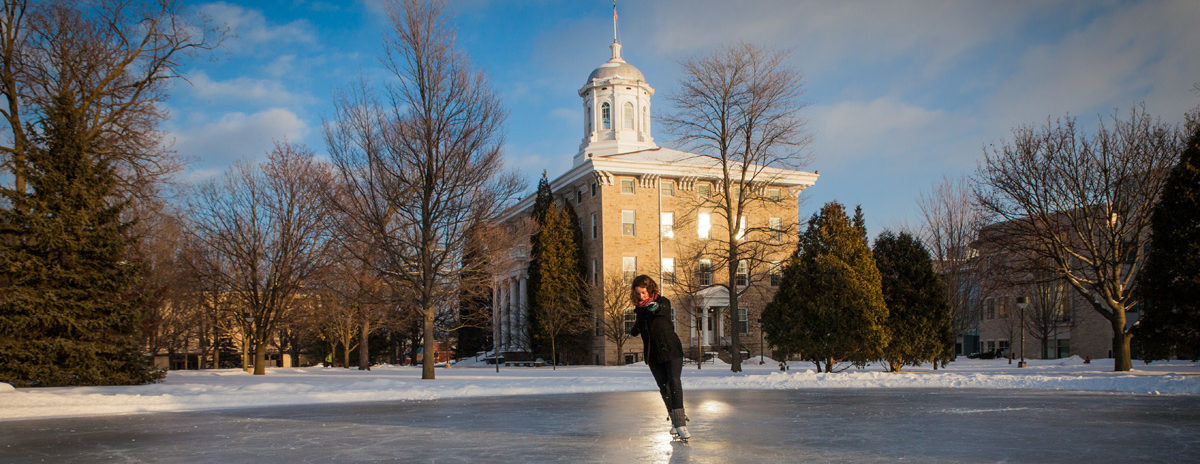APPLETON, WIS. — Madhuri Vijay wants to violate the first rule of writing: write what you know.
Having spent the past four years as a student at Lawrence University, Vijay knows what it’s like to be an Indian living in the United States. But the senior from Bangalore, India, wants to explore what life is like for her countrymen living in other countries.
“I want to turn that rule on its head, travel the world and get to know the things I want to write about,” said Vijay. “I want to tell the stories of people like myself, people displaced from their native country, living in a vastly different one who are forging an identity that must inevitably come to terms with a double-history, a double life.”
Beginning in August, Vijay will embark on a year-long search for those stories as one of 40 national recipients of a $28,000 fellowship from the Rhode Island-based Thomas J. Watson Foundation. Vijay was selected for the fellowship, which supports a year of independent travel and exploration outside the United States on a topic of the student’s choosing, from among 177 finalists. Her fellowship proposal was entitled “The Two ‘I’s in ‘Indian’: Writing the Stories of the Indian Diaspora.”
Nearly 1,000 students from 47 selective private liberal arts colleges and universities annually apply for the Watson Fellowship.
Vijay will use her fellowship to travel to Fiji, often referred to “Little India” because of its large Indian population, Kuala Lumpur, Malaysia, which has had contact with India since the 15th century, Durban, South Africa, where Indian leader Mohandas Gandhi established the Phoenix Settlement for Indians who wanted to peacefully resist oppression, and finally Tanzania, which boasts two distinct Indian populations: one that was born and raised there and one that has recently arrived.
“In this ever-flattening world, Indians are found all over the world, but their stories have largely gone untold,” said Vijay, who will graduate in June with a degree in English and psychology. “As a writer and a social scientist, I have a fascination with people, cultures and identity. I would like to combine my two passions to produce a book of short stories about the lives of Indians around the world.”
Tim Spurgin, associate professor and Bonnie Glidden Buchanan Professor of English, who serves as Lawrence’s campus liaison to the Watson program, calls Vijay “a perfect choice” for a Watson Fellowship.
“Madhuri is bright, talented and basically fearless,” said Spurgin. “Not many college grads would attempt a project as ambitious as hers — and only a handful would be capable of pulling it off.”
During her travels abroad, Vijay will explore what Indian customs and traditions these people still cling to, what aspects of their new country they’ve embraced and how they balance the cultural line of being native Indian with being Tanzanian, Fijian or Malaysian.
“I realize that shared skin color and features are no longer enough to claim a kinship with Indians around the world,” said Vijay. “Writing stories of the people I’ll meet will allow me to understand the unique and multifaceted identities of the Indian diaspora. It will help me develop my own transcontinental identity as a woman from India, a student in America and a citizen of the world.”
In addition to helping define her own personal identity, Vijay sees her fellowship opportunity as a litmus test for her passionate, but largely unspoken, ambition of being a writer.
“I share the seed of self-doubt that plagues all aspiring writers: do I have stories worth telling? And do I have the words with which to tell them?,” said Vijay. “I believe that I do and I want to prove it. My fellowship will be nothing short of a journey of self-discovery, because at the end of it, I’ll know what my next step in life should be.”
If she wasn’t previously a believer in the axiom “first impressions are lasting impressions,” Vijay surely is now. The Watson selection committee started their interview process this year at Lawrence last November and Vijay was the very first of the 177 finalists to be screened.
Vijay is the 67th Lawrence student awarded a Watson Fellowship since the program’s inception in 1969. It was established by the children of Thomas J. Watson, Sr., the founder of International Business Machines Corp., and his wife, Jeannette, to honor their parents’ long-standing interest in education and world affairs.
“The awards are long-term investments in people, not research,” said Cleveland Johnson, director of the Watson Fellowship Program. “We look for people likely to lead or innovate in the future and give them extraordinary independence in pursuing their interests. They must have passion, creativity and a feasible plan. The Watson Fellowship affords an unequalled opportunity for global experiential learning.”
Watson Fellows are selected on the basis of the nominee’s character, academic record, leadership potential, willingness to delve into another culture and the personal significance of the project proposal. Since its founding, nearly 2,600 fellowships have been awarded.

